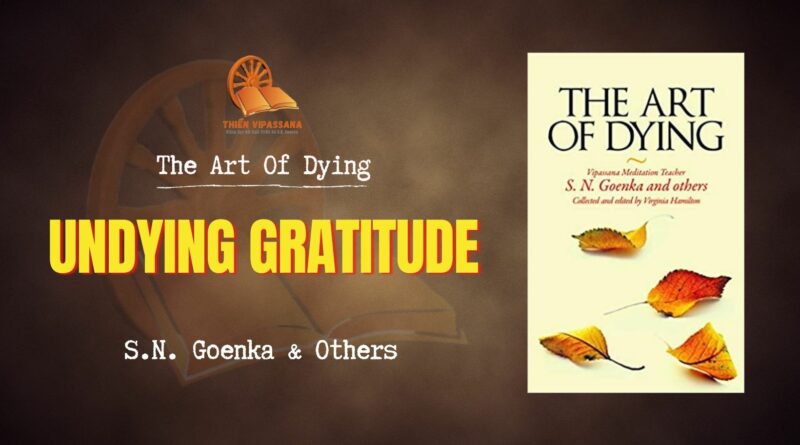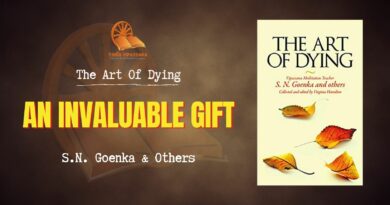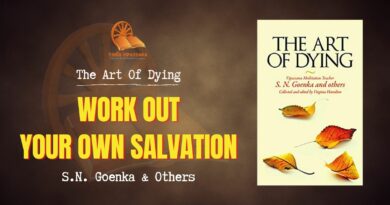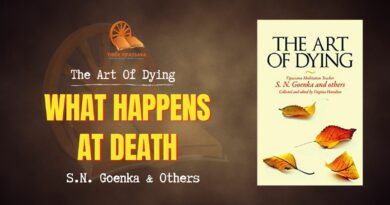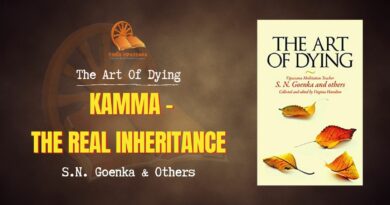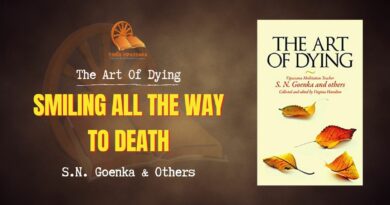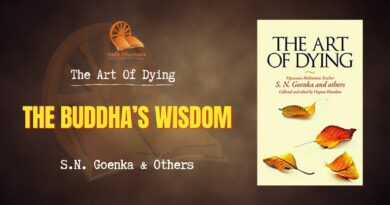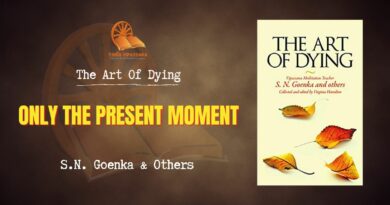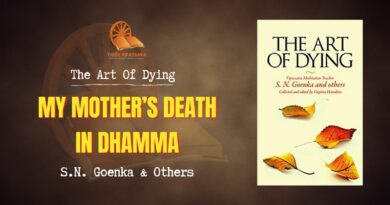Undying Gratitude
In 1989, when John Wolford was 18, his father Carl gave him the gift of Dhamma. What he learned and practiced enriched his life from then on. In 2005, in his mid-thirties, he was diagnosed with a malignant brain tumor and surgery soon followed. From the moment he first learned of his illness until November 2007, he purposefully dedicated his life to an increased engagement with Dhamma and to sharing it with a greater sense of gratitude, even finding gratitude for his illness.
The cancer eventually spread to his spine, ultimately causing his death. However, this allowed him to die consciously rather than in a coma, as is more usual with brain tumor patients.
Initially John did not experience significant mental or physical problems. The headaches and other symptoms, which are so common among people with brain tumors, set in only at the very end. He remained, for the most part, strong and energetic, and was therefore able to respond fully to his new-found sense of spiritual urgency.
Fortunately, he was able to give up his job and devote himself full-time to sitting and serving Vipassana courses, including the 10-day Burmese-English course he served with his wife Dhalie at Dhamma Toraṇa, Ontario, only three months before he died. He worked in the kitchen, but had to absent himself regularly because the oral chemotherapy he took each morning made him nauseous. Still, during this course, he managed to compile the stories and audio files that he had collected while traveling in Burma so he could create DVDs of this Dhamma material for the Burmese students on the course. He hardly rested until the lights went out at 10 pm each night. By this and countless other gestures, his thoughtfulness, generosity, and gratitude infused and inspired all who knew him.
Following are letters from John and his mother.
Dear Goenkaji,
It’s difficult for me to tell you my “story” as there are so many aspects to it, and hard also to know how to express adequately the magnitude of my gratitude to you.
Many years ago my father brought me to my first Vipassana course, conducted by Arthur Nichols. I knew then that this was the most important thing in my life, but it has always been a struggle in various ways. This changed in February 2005, when I was unexpectedly diagnosed with a large, malignant brain tumor. Actually, my whole life has changed since then.
Based on that first diagnosis the doctors thought for some time that I would be dead in nine to 12 months. This was a shock, of course, but it also shook me in some very positive ways—in fact, Vipassana just “took over” and calmed me then and there. I was instantly grateful that I was dying of a brain tumor, which would give me some time to process things, rather than finding myself in front of an oncoming car and having mere moments before it ran me over.
During the next few months the doctors lengthened their prognosis from nine to 12 months to decades, and then shortened it again to seven to 10 years. I remained all the while grateful that I had time left to use the Dhamma as best I could. And I was grateful too that I had this invaluable tool given to me so long ago.
I was grateful for and to my wife, Dhalie, also a meditator. I initially thought what I was going through was mine alone, as it was I who had the tumor. But it quickly became clear that Dhalie was with me the whole way. We both became so quiet inside, so calm, and realized immediately what a huge advantage this was. We were grateful for the opportunity it presented to support the Dhamma in us, to develop the Dhamma in us, and to use the Dhamma in us. It helped us tremendously, and continues to help us help ourselves, and help each other.
I was also grateful that my mother, who had always been interested but “never had time” to take a course, was now interested in doing so. As one can imagine, the news of this tumor came harder for her than anyone else, and she was desperately looking for a way out of her misery. Fortunately she made a wonderful decision, and within weeks of my first operation my mother was sitting her first course with Dhalie and me, and with my father serving.
Up till then I was content that my wife, father, and brother had all sat and served courses, and I knew that however things turned out they would be OK at the end—but I couldn’t say that for my mother. Now I was happy that she was taking a course, taking the seed of Dhamma, and that I could contribute in some way.
She has subsequently attended two more 10-day courses and a Satipaṭṭhāna Sutta course, and I have been fortunate to serve on all of them. She has maintained her daily practice easily, and now reads hardly anything but Dhamma books. We converse about Dhamma all the time—she soaks it up like a sponge, never protesting, “I’m saturated; I can’t take any more.” And I get to be a part of that.
I’m grateful that my health insurance company agreed to support me financially, and I have therefore been able to stop working. My time now is completely freed up to spend with family, friends, and the Dhamma. Dhalie, my mother, and I sit together regularly.
To you, Goenkaji, my Dhamma father, I have a huge debt, and am exceedingly grateful that I can continue repaying it by serving the Dhamma on your behalf in different ways. I am planting as many good seeds as I am able, serving to help you spread the Dhamma as far and wide as possible.
I am, as best I can, doing your service justice by developing Dhamma in me. I try to keep sīla scrupulously, giving it now the utmost attention. Samādhi and paññā are so precious, so valuable, and help me understand and strengthen my sīla. I have developed a much greater appreciation for your explanation of how “all the legs of the tripod support each other.”
All of this can only be done with time, and again I am so grateful for whatever I have left. The cancer has been in remission, but recently we found that the tumor may have started growing again—we need to check this soon. This disease will probably shorten my life but, who knows, maybe the tumor won’t grow again and I’ll die of something else instead.
Whatever the case may be, I am here now, I have sensations now. I shall do my best to help myself, which, I’m so grateful to say, automatically means helping others as well.
Thank you, Goenkaji, for all your Dhamma teaching. Because of it, my father, mother, brother, wife, friends, and unknown thousands of people in the world are able to help themselves, which means they in turn will help countless others.
With so many thanks
and with mettā,
John
From John’s Mother:
Dear Goenkaji,
What can I say to express my gratitude for the invaluable benefits my family and I have gained through receiving the priceless gift of Dhamma? I am sending a few short stories to you, such a wonderful story-teller, to illustrate the power of Dhamma in my life.
First story
Last January, when I learned that my eldest son, John, at 34, had a large brain tumor, I was filled with shock and horror. By February he was admitted to hospital for brain surgery. In contrast to my own reactions, I could not fail to notice his courageous and unprotesting attitude. Instead, he showed compassion and caring for those of us who were so distressed by these unexpected events.
Shortly after the surgery, which lasted about five hours, I visited him in the recovery room. The first thing I asked was, “John, how are you feeling?” With his eyes closed and a small smile on his face, he replied, “Sensations are rising; sensations are passing away.” Later, when I spoke with him about it, he could not remember saying those words. But he told me that, before entering the operating room, he started observing sensations in his body with the intention of maintaining that practice throughout the surgery, to whatever extent possible.
I know that a significant aspect of my agitation was my helplessness to save my son from this vicissitude. But I was learning that Dhamma could. Through the benefits of practice, my son was transforming something terrible into a tool, a precious gift to advance on the Dhamma path.
Second story
A few days after John’s surgery I visited him at the hospital. I asked him about his practice of Vipassana. I wanted to know how it gave him remarkable strength in the face of this terrible disease. As he spoke of his experiences with Vipassana, he told me that for a long time he had maintained a wish that one day I would take a course and he would serve on that course.
In the past, both he and my younger son Dharma had suggested that I could benefit from attending a course. Naturally, for years I was always too busy! Suddenly, I wasn’t busy any more! Not knowing if John would ever leave the hospital, I told him that the next course he went to, I would be there too. It seemed a small wish to grant and a way to offer my son support. I could never have guessed the benefits I would gain, nor that my son was again transforming his cancer into a vehicle for the gift of liberation—mine!
Third story
About a month later, I found myself in a car with John, his wife, Dhalie, and his father, Carl, all seasoned Vipassana meditators. We were traveling to Dhamma Kuñja in Washington state, where I was to take my first course. What a course that was! How I burned with rage and resentment against things I could not even name. How could I escape? How could I run away when my eldest son was sitting in the same room, a large tumor pressing on his brain?
I stayed, and somehow in the small intervals between being engulfed in my own chaotic reactions I tried to apply the technique I was learning. In the middle of the 10 days I wondered how I would tell my son that this path is not for me; by the end of the course I wondered how soon I might return to do it again! Since then I have attended two more 10-day courses and maintain a daily practice. In a week I plan to sit a Satipaṭṭhāna Sutta course at Dhamma Surabhi, British
Columbia. John will serve on that course. So that I can start to serve Dhamma in some way, I am being trained as an on-line worker to help register students as they apply for courses.
Sometime after that first course I told John that he had thrown me a lifeline, but that when I first grabbed hold it felt more like a live wire, with me sizzling, snapping, and popping on the other end! After returning home, I noticed my life changing for the better in many ways. Family and friends have told me they see a change for the better in me. Most important, I can share the precious moments in life knowing they must pass, and face the suffering without being totally engulfed in anxiety and fear.
I attribute all these benefits, and more, Goenkaji, to the inner transformation brought about by taking that first course! My relationship with all my family members has improved, and I am fortunate to be able to sit with John and Dhalie on a frequent basis and to enjoy Dhamma conversations with them as well. Their practice-in-action and their loving-kindness have been a constant inspiration to me.
It is a great comfort to see John making the best use of his time. Since he is free from working a regular job, he works instead to spread the Dhamma every day. The doctors now think that his tumor might be starting to grow again. But if his health permits, he will travel to India with Dhalie, and she will sit the Teacher’s Self-Course at Dhamma Giri in November. John is on the waiting list to serve the same course. In January, my partner and I will fly to Burma and join them. We shall visit various Vipassana sites and, we hope, sit a course at a centre there. We have been accepted to sit a 10-day course at Dhamma Giri at the end of January before returning to Vancouver. That these things will happen remains to be seen. Nonetheless, it remains true that my life has changed for the better beyond anything I could have imagined.
I know I have a long way to go to dispel my own ignorance and to overcome habits of craving and aversion. With all the benefits, I am still far from equanimous about certain facts of life, including the fact that John has cancer and the doctors can do nothing to help him. I have turned to Dhamma as my life raft in these turbulent seas. I will continue to make my best efforts to sail onward.
As I wish to be free from craving, suffering, and misery,
May all beings be free from craving, suffering and misery!
May all beings be happy!
With respect and gratitude,
a humble student of Vipassana,
Laurie Campbell
Three years later:
Dear Virginia,
I’m happy to share the letter I wrote to Goenkaji. Sometime after I gave it to John to arrange for delivery, John asked if I’d give permission for some part to be printed in a newsletter or some such. I readily agreed at the time and would be happy if it might help anyone else. John’s letter is here too, as you see.
I appreciated your sharing some stories of John as a young student. It brought a smile to my face.
I have one more story to share. When John was in hospital for the last time, at some point I became aware that he was unlikely to go home again. It was early November 2007. I remember saying to him one day that if he were to pass on my birthday, I would light a candle for him in my heart every year thereafter. In retrospect, it seemed a strange, macabre thing to say. I have no idea why I said it.
John died on November 20, my 59th birthday. I experienced his going as his last gift to me. I would have done anything to have my son outlive me—I know that through and through. But I was not in a position to make that happen, nor to decide what was for his own highest good. Nor, actually, what was for mine.
At the time, I thought his going on that particular day was an incredibly direct gift and message to me—he was free from suffering at last, and those final days and weeks were terrible for what he endured. Since then, as my birthday approaches, I reflect both on John and his amazing loving generosity of spirit, and on my own approaching, inevitable death. I know he’s made my own time of letting go easier, whenever it will come. In the meantime, my understanding of anicca has been profoundly deepened.
From the moment John learned he had a brain tumor, through to his death, his own personal process of growth and development accelerated. It was amazing to watch his sharp edges melt away, and to witness and enjoy the loving energy he so freely shared with whomever he came in contact. Near the end, it was a privilege to watch the dissolution of his ego and the complete emergence of the essence of being: love. The vehicle for his transformation was his practice of Vipassana, there is no doubt. John took a crash course in the art of living and came through in fine form.
It was his great good fortune to receive the gift of Dhamma through his father. One can’t see the miracle of John’s journey exclusive of Carl’s influence, and in my heart I owe Carl a huge debt of gratitude in bringing both of our sons to Dhamma. I am forever in his debt, but then, as he has pointed out to me, the ripples and the debt spread out to include all who helped him along the path, back and back through teachers and students, all the way to the Buddha.
It has been an amazing journey—painful, and yet rich with gifts of love and compassion. So much has come my way, including the loving-kindness of many who were touched by John and in turn magnanimously extended themselves to me.
I’m afraid, though, that I’m not at all like some of the writers who people your book. As the anniversary of John’s death approaches I’m aware of the awful pain of loss, the resurfacing of barely concealed grief. However adept I may be at employing my intellect to make sense of it all, and even in times of more integrated knowing, the harsh fact of his ending still grieves me beyond speech. I am not equanimous, and the best I can do is sit with the pain, endure, and try to apply compassion to my seemingly intractable clinging. I know the grief is all to do with me, what I want, how I wish the universe to be ordered. Should I grieve that my son is free of this lifetime’s suffering? That he was successful in transforming the basest of metals to gold? Should I grieve that he grew and grew in love until that was all that remained?
When I think of my children, I am amazed. They have been teachers on so many levels, and I’m in awe that somehow I have had them in my life. John has been gone almost three years now, yet in many ways he is with me still, influencing and guiding. I am a most fortunate mother.
With all the mettā,
Laurie
Attanā hi kataṃ pāpaṃ,
attanā saṃkilissati;
Attanā akataṃ pāpaṃ,
attanāva visujjhati.
Suddhī asuddhi paccattaṃ,
nāñño aññaṃ visodhaye.
By self alone is evil done.
By self alone is one defiled.
By self alone is evil not done.
By self alone is one purified.
Purity and impurity depend on oneself.
No one can purify another.
—Dhammapada 12.165
Pralayaṅkārī bādha meṅ,
tū hī terā dvīpa.
andhakāramaya rāta meṅ,
tū hī terā dīpa.
In the all-destroying deluge
you alone are your island.
In the darkest night
you alone are your lamp.
—Hindi doha, S.N. Goenka
Bài viết này được trích từ cuốn sách The Art of Dying – Thiền Sư S.N.Goenka và nhiều tác giả khác.

